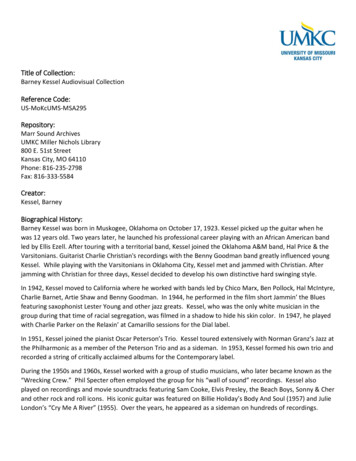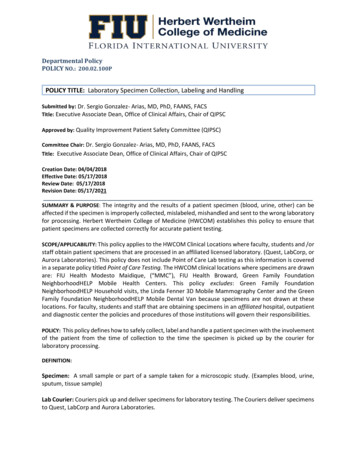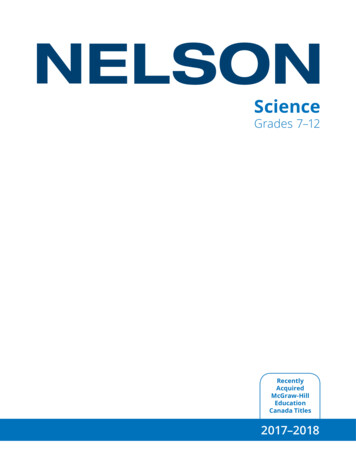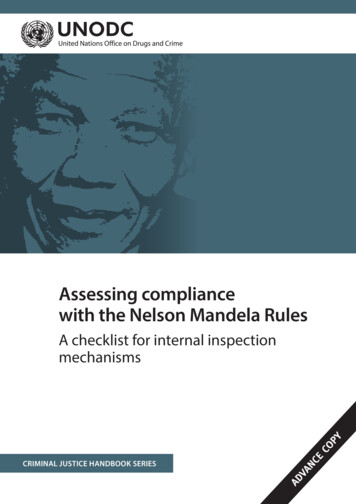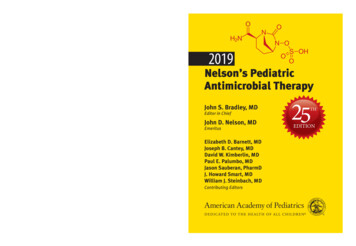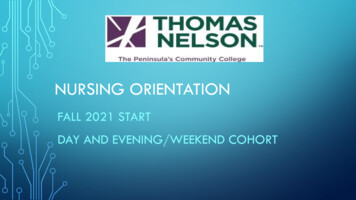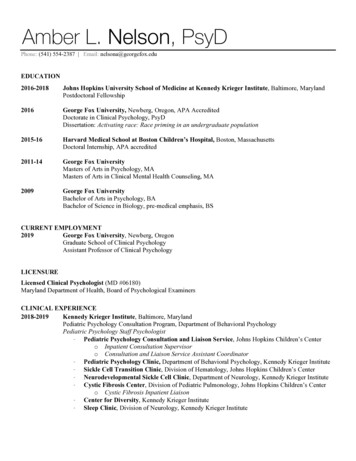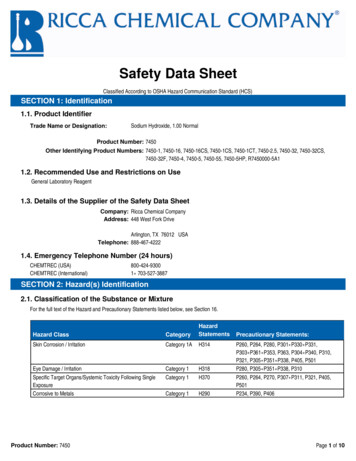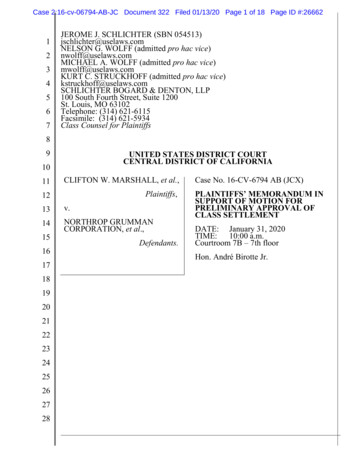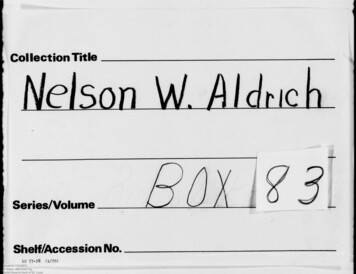
Transcription
Collection TitleNelson W. A!dacSeries/VolumeShelf/Accession No.Digitized for FRASERhttp://fraser.stlouisfed.org/Federal Reserve Bank of St. Louisxd
NELSON ALDRICHDigitized for FRASERhttp://fraser.stlouisfed.org/Federal Reserve Bank of St. Louistioiletalf conzhssianMISCEL1M
Digitized for FRASERhttp://fraser.stlouisfed.org/Federal Reserve Bank of St. Louis\I ONMONO. SEC.TABLE OF CONTENTS.Page.Scope of the report.Banking :eatures of crisis of T 907Investigaton of foreign banking systems.Relation of European experience to American conditions.Principal objects of the proposed. plan '"— (1) Concentration of reserves.(2) Elasticity of the note issue.(3) Restriction of business to commercial(4) Ccxmlination of the banking system(5) Leadership ill the money market.C(x)perative character of the reserve assi)ciation.Operation and adequacy of the proposed plan. The concentration of reserves.Evolution of present currency conditions.The system of note issue( ) The requirement of minimum reserves.( 2 ) Special taxes on deficiencies in reserves.(3) Special taxes on excess circulation(4) Legal status of the notes.Resources of the reserve association for meeting periods of pressure.The concentration of reserves. (2) Authority to grant rediscounts(3) The power of note issue(4) Changing the rate of discount.(5) . Authority to deal with foreign banks().Dealing in ',foreign billsFacilitatingliomestic exchange.Advantages of the proposed plan to the business community.(1) The better distribution of capital.(2) Stability and uniformity in discount rates. .(3) The encouragement of commercial banking(4) Competition in foreign markets.(5) Security against panicGuaranties of management in the public interest. .(I) The democratic form of organization of the reserve association.(j The participation of the Government in the management ofthe association(3) The limitation of the profits of the(4) The reArictions upon the character of business permitted.(5) Position of responsibility at the head of the financial system.(6) Pnblicit v of the operations of the associationc1 O—t17tz 4r)- -11Lir-t,L44 4.) v
14xf.Altdtet,4IGic7 e. %.4.- 1i-t t).k2a ---3,7d1CCr- 6, 3?:4 376Pie IdrnngrnInLiruIdJdn glitifiljaftoltben3allre 1900 II.Itialltrubechiter Boltb.OgIbutarkt. girtbitbanken. )fliteitniqnVeber, :qrnolb,Digitized for FRASERhttp://fraser.stlouisfed.org/Federal Reserve Bank of St. Louis,Cecb t,etffericb, ernjt vo(1biter i nhteCr.
eixr , ",S7):1.1pp; C:ITO -Si-ENGLER, DIIIIECTs,J;Oa.1 ". ErNew 3'02 hird Ave,CLIPPING FRO(,'!,OSTeNMONITORL /14,1BANKIG EFORMNOT INTERESTOF SPECULATIONMint Director Says NationalReserve Association's Purpose Should Be in Aid ofGeneral BusinessTO END BANK RUNSWASHINGTON, D. C.—George E. Roberts, director of the mint, says that thecountry's banking system must be reformed in the interest of general business and not in the interest of speculation. He disagrees with James J. Hillthat the National Reserve Association,the proposed plan of reform, should accept stock exchange collateral as securityfor loans, and says the association shouldonly loan on commercial paper arisrngout of day-to-day trade transctions."I think the organization of the National Citizens League is oneof the mostpromising signs of the times looking tobanking and currency reform," said Mr.Roberts."This movement got its first impetusfrom the panic of 1907. Everybody knevwhile that panic was on that somethibanking sysWAS wrong with ourThere are two things that art rmental itLbankirg: the banks s'f 4always- retisly1„.tomparm4eimaku :to loan forh-rent needs of their custobsome reasonable rate. In view (,experience in the past those two cf,tions may seem to make a very la',contract, but in every other importancountry of the world those conditionsare met. There is plenty of proof thata properly organized banking systemcan meet them."There is an end to bank 'runs' whenever it is known that the individualbanks will be adequately supported, andthe amount of credit required to handlethe current exchanges can always besupplied. Of course, no banking systemcan undertake to furnish all the creditthat may be wanted for speculation orextravagant construction, but it can andshould furnish all that is needed to6 move the crops and make the currentexchanges of trade."Our system broke down in 1907, whengreat railway systems could not get,Digitized for FRASERhttp://fraser.stlouisfed.org/Federal Reserve Bank of St. Louis
AiaRobC.—George "F,. thethatD.re111111t, saysmust bebusithe1system generalingspeculainterest ofinterest of J.in the with JamesNwociation,agrees Reserveshould acionalreform,sritytecuplan ofcollateral as shouldassociationchangegnsthepaper arisaysd commercialtr nsctions.ontradethe -Naoanly.ation ofthe most-to-dayrgione oflooking totheLeagnelir.'Lena Les lie timesreform," saidsigns ofcurrencyimpetusantifirstitsmovement got Vserybodysomethi100'I.panic of was on thatfkg sypanicatwith 0Vtr that areTongthings banks f0two1)1e,areIrLbankiv g:retit:fr -4 4 kiaDigitized for FRASERhttp://fraser.stlouisfed.org/Federal Reserve Bank of St. Louisuauu—auy to loan for-cent needs of their custou3 some reasonable rate.In view cexperience in the past those two cctions may seem to make a very laicontract, but in every other importancountry of the world those conditionsare met. There is plenty of proof thata properly organized banking systemcan meet them.'There is an end to bank 'runs' whenever it is known that the individualbanks will be adequately supported, andthe amount of credit required to handlethe current exchanges can always besupplied. Of course, no banking systemcan undertake to furnish all the creditthat may be wanted for speculation orextravagant construction, but it can andshould furnish all that is needed tomove the crops and make the currentexchanges of trade."Our system broke down in 1907, whengreat railway systems could not get/5money for their pay rolls; the movement of such staples as cotton and'2wheat came to a standstill and hun18dreds of thousands of wage-earnerswere thrown out of employment.4"Every consideration demands thatthe country be safeguarded against arepetition of this experience. It is morethan a banker's problem or merchant'sproblem; it involves stable , markets forthe farmer and steady employment for2 the wage-earner. It is more importantto wage-earners Allan any other single4question, more important to farmersthan a year's crop, more important toall classes than any disposition of thetariff or trust questions can possibly be.4 It is now up for action and ought tohave right-of-way over every other6 issue until it is settlell by a comprehensive and final treatment."There is no wide disagreement amongthe friends of banking reform. It isagreed that our system lacks unity andcohesion and reserve powers. There isgeneral confidence that our banks aresolvent, but no confidence in a crisisthat they will be Ale to maintain cashpayments or grant needed accommodations. The banks feel their own helpitlessness, and their struggle to keep uptheir cash reserves and reduce theirloans do even more to demoralize thesituation than the actions of the public,"What is wanted is some responsibleorganization. with reserve resourceswhich command complete confidence,that will stand back of the individualbanks and support them when help isneeded by taking over some of their3 assets and advancing cash thereon, Experience elsewhere has demonstratedthat the demands upon such an institution can be effectually controlled byraising the discount rate. That is thegeneral principle to which the rest ofthe world has come, and it is now commonly accepted in this country. The,only disagreements seem to be over thedetails of tbis organization."I see no reason to fear that such anorganization will be controlled in theinterest of a locality or clique. Thecontrolling board will be chosen from allsections of the country, with properchecks and safeguards, but the most important safe4oard is a regulation as tothe character of paper that shall behandled."I see that Mr. Hill argues that goodbonds should be accepted as collateral.No doubt the bonds of good railwayand industrial corporations are a safesecurjty for lottos, but there is practi5 cally no limit to the supply, and the7'2 only real danger that exists, that the.1 organization might be used for stockoperations or promotion schemes, lurks.oili,in the 11841 of this classunptiof tolateral."Warehouse receipts for wheat ant.1, coocottont.m)f rin iloftoitliesaere coiditr tNie.tsrerie‹,88"11)11A- mustb110.1 eyondbea sYoel find theloi').Paul. If th.(J
tendant, wishes position. Tel. Lilian('4543-.I. MARIE ZURCHER,. 6744 Thomasblvd. Pittsburgh, Pa.4ATTENDANT—Young woman attendantwishes position with party traveling to Paeine coast ; will work for expenses. MISSJENNIE L. 'lomat:. 329 North 1.117„11 at.,Mount Vernon. N. Y.2A TTE N DA NT—Trained A merican desire;;position IIP attendant and eompanion toelderly lady; experienced; reference. MISSLILLIE HARBOURNE,. 273 144ncoln st.Flushing. N. Y.CLERICAL—biri (17)—WISIIPS.110Niti011 asoffice assistant. ANNA XRUB1, 1541 Ave.A. New York city.1COMPANION AND MAID to elderly oryoung lady; nnderstands dressmaking,mending. care and dressing of hair, etc.ROSE JEANETTE KENNEDY. care Wm.J. Brown, 34 South High st., Mt. Vernon.N.Y.6COOK—American woman wishes position to do plain cooking in family ofadults; kind home preferred to high wages.HELENA KAVANAUGH, 238 Atlantic ave.,Brooklyn,31N. Y.iffM0N ST lt ATOR and saleswouthex pert, desires position with good house;willing to travel; Al references. V, M.SHEPA RD, 145 lnion a ve. SaratogaSprings. N. Y.DRESS-MA failt". 1 experienced, excellentfitter, conscientious, satisfactory, wishesposition; best references. MRS. S. AltruAoA, care Reid, 218 W. 128th at., NewYork.4DRESSMAKER, 7 .veiiisr experience, cutting, fitting, remodeling, desires work; references. MRS. E. GARDNER, 16 West. 31stat., New York.—HOTEL STENOGRAPHER. experienced,desires position in Boston or elsewhere;references. MISS WHITAKER, 179 Franklin at., Buffalo, N. I.4HOUSEKEEPER—Lady desires positionas housekeeper, companion or secretary;has taken responsible charge of gentleman's'.ome aid children; highest references.155 J. KNOWLTON, Fulton, N. Y. Gen.%eq.2'IlSEWEEPFIR would like position infimily or institution;P. C. iLLAW. 34 Ormond p) Digitized for FRASERhttp://fraser.stlouisfed.org/Federal Reserve Bank of St. Louis1tt(1
Jew 0);31.11 10'.5Sth st.'ATE ifECRETARt------Miven yea.,osition; capable and efficient; excepal‘ references; prefers Philadelphia orvy York. L. W. REEVE, 4807'Regent at.,eat Philadelphia.1REFINE-I) YOUNG GIRL wishes. position, secretary, companion to elderly lady;cheerful, obliging; typist; experienced; references. wittimu,.3137 Fairfax ave., Westchester, N. Y.31SEAMSTI1ES8—Neat, reliable coloredwoman „wishes plain machine sewing fewdays Weekly; moderate pay. MRS. F.JOSEPH. 119 E. 100th at.New York. 31.14EalittSTRYISS desires employment; plainsewing, darning or buttonholes. BELLASHOEMAKER, 1949 N. 13th st., Philadel6phia.STENOGRAPHER, experienced. desiresposition, private secretary preferred; references furnished. HILDA SNYDER4 452 KWalnut lane. Germantown, Philadelphia.:3Pa.STENOGThaillElt and typewritgr, youngwoman. thoroughly capable SIMI eXperieneed, rapid and accurate wishes high classposition In New York city. E. PATTEIt 3SON, 162 E. 115th st. New York.STENO(fftAPIIElt ANT) TYPhiCilITER—Young lady, nearly 18, desires position invicinity of Newark, N. J. or (iewntown InNew York city ; Is accurate and painstakingIII her work. neat and ladylike in appearance. OLIVE 1111.13KRT, 87 Quincy ay.Arlington. N. .1,3ti E MIT book ke-iii er, someexperienee, hard worker, moderate salaryto begin. KAPLAN SCHOOL. 1731 Pitkluave. Brooklyn, N. Y. Phone 660 Enst NewYork.4-STENoiTIRAPHER of several years' experience. thoroughly competent and reliable,desires position; will go to Kenosha or Milwaukee, WIN. MISS MARY ALIcm 0141YER. 24:i Frank ave. Racine. Wis.3STENOGRAPHER, first-class, desires position; German and English diction, translations; experienced in 'Import, advertising.111R11rance; had charge of department.ELISE M. CORDSEN. Suffern, N. Y.-tirCENOGitAPHER-TtPIST desires position where Jim services of a capable, experienced and trustworthy stenographerwill be appreciated; moderate salary; referenees. .GEwrituDE FOX, 195 Adelphi st.,Brooklyn, N. Y.--TOTOlt---Yonng lady, graduate of ParkerCollegiate Institute. wishes 'position totutor in elementary subjects, LOD. Prinichawl German. Address M. PRESSPRICH,256 79th st. Brooklyn, N. Y. Phone 3421-.1Bay Ridge.VISITING GOVERNESS (French), linguist, seeks morning position; would takechildren walking; references; apply byletter only stating particulars. MISS E.BT7RKY. 2o7 W. 24th st:, New York city. 4 ic04.*.118s,Intec.ii 11leY,rto'i1iiitl1-41,4 11s,IcIs11C.C.-tsterNEVI)/70111( ? Trye Want AdDNITOR ?GTWODigitized for FRASERhttp://fraser.stlouisfed.org/Federal Reserve Bank of St. Louis411.
Digitized for FRASERhttp://fraser.stlouisfed.org/Federal Reserve Bank of St. Louis1 RHMONO. SEC.The formation of clubs and societies for the serious studyof economic questions is a hopeful sign of the times.Modern economic conditions have developed new problems of vast importance which are pressing upon theAmerican people for solution. Among these none is moreimportant, with reference to the future development andwelfare of the country, than that which is submitted tothe National Monetary Commission. The question of howbest to secure a comprehensive organization of our financial institutions and a thorough reconstruction of ourmonetary system is one of vital interest to the people ofevery class and every section. There can be no wise orpermanent legislation, no final solution of this problem,that is not supported by intelligent public opinion. Enlightened public opinion must be based on the final judgment of thoughtful men who have thoroughly investigatedthis great question from the practical and theoretical point of view.We are living in a new economic era, brought aboutby the march of civilization; by wonderful improvementsin methods of transportation and the transmission ofintelligence; by important changes in business and industrial methods; and by remarkable discoveries in the artsand sciences.The wonderful transformation which has taken place inevery direction in recent times has added greatly to theresponsibilities of bank managers. In our complex economic life credit forms a more and more importantelement in the successful development of communitiesand States. As in the earlier days, every successfulbank manager is brought into close and confidentialtelatiOriS.'With the men upon whose activities and influence the welfare of every community depends. Hisadvice and assistance are solicited for the promotion andsupport of every industrial enterprise, and his counsel isasked with reference to the investment of the savings andearnings of the people he serves.In respect to their important responsibilities in this connection the great mass of the bank managers of the UnitedStates leave nothing to be desired. In no other countrydo we find their equals in the uniform courtesy and intelligence with which their business is transacted. They arevigilant in safeguarding the interests of their stockholdersas well as their customers. Nowhere else do we find thesame skill in the technique of the profession. The practical details of the business of a bank are conducted herewith a facility and rapidity quite unknown wtsifie the.,United States. Everyone who has attempted to transactthe simplest business in a foreign bank—cashing a check,for instance—will confirm this statement.We may safely assume, therefore, that so far as concerns the personality of bank managers, their conduct ofthe routine affairs of their banks, and their personal relations to customers, depositors, or borrowers, there is nodemand for new or improved conditions.Notwithstanding the possession of these admirable personal qualities, the bank'managers of the United Statesfind themselves unable to meet the new and serious dutiesand responsibilities which are imposed by the momentousphysical and financial changes which have taken place inrecent years. 4*a4
Digitized for FRASERhttp://fraser.stlouisfed.org/Federal Reserve Bank of St. Louis- United States. Everyone who has attempted to transactthe simplest business in a foreign bank—cashing a check,for instance—will confirm this statement.We may safely assume, therefore, that so far as concerns the personality of bank managers, their conduct ofthe routine affairs of their banks, and their personal relations to customers, depositors, or borrowers, there is nodemand for new or improved conditions.Notwithstanding the possession of these admirable personal qualities, the bank'managers of the United Statesfind themselves unable to meet the new and serious dutiesand responsibilities which are imposed by the momentousphysical and financial changes which have taken place inrecent years.The inability of bank managers to meet these changedconditions is due in a large part (I) to the limitations andrestrictions imposed by antiquated or obsolete laws withreference to the treatment of reserves; in part (2) to adefective, inelastic, and unscientific system of note issues;and (3) to an entire absence of cohesion and cooperation on the part of banks in what are now their moreimportant functions—those in which the public has thedeepest interest.The necessflry cooperation of banks for mutual protection and support at critical times is rendered impossiblenby unwise, artificial restrictions. This lack of cooperatioin times of pressure, exceptional or otherwise, transformsIndividual banks from a condition of independence to oneof complete isolation and dependence. In emergenciesthey are without the power to serve successfully the interests of either their stockholders or the public. The situation in this respect is illustrated by the fact that thecountry banks now entirely depend for assistance toenable them to meet unusual demands upon their resourcesupon their correspondents in reserve or central reservecities; and, in the last analysis, the banks of the entirecountry expend for their support upon the financial institutions of New York, with their vast accumulations ofcapital.Unfortunately, for reasons which it is not necessary forme now to recite, in times of severe stress all these agenciesfail or prove inadequate. We are confronted, therefore,with the fact that the banks and the business of the countryhave no reliable resource upon which they can depend atlall times for the protection of vital interests. Exceptionademands made upon the banks for credit, arising from anexpansion of business or otherwise, and the regular recurring movements of lawful money from one section of thecountry to another, are disturbing elements of more or lessimportance, liable to lead to widespread distrust, resultingat times in a general suspension of cash payments and
Digitized for FRASERhttp://fraser.stlouisfed.org/Federal Reserve Bank of St. LouisRH2MONO. SEC.the complete disruption of all exchanges.In the losses and paralysis incident to general banksuspensions, the banks themselves are not the only-In fact, they are not the principal—sufferers. Banks, ifproperly managed, are usually able to take care of themelves. Not infrequently they pass through the trials of apanic with increased earnings and unimpaired resourcesI do not mean by this state ment that the intelligent bankManagers of the United States on this account look withbelieveindifference upon a panic or panicky conditions.the intense strain to which the bankers of the United'States were subjected in 1907 taught them i a practicallesson which they never will forget and that
I ON MONO. SEC. TABLE OF CONTENTS. Page. Scope of the report. . Banking :eatures of crisis of T 907 Investigaton of foreign banking systems. Relation of European experience to American

